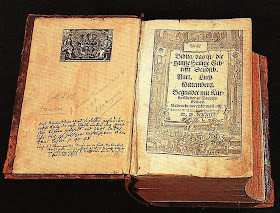What companion
would be closest to a man who was a theologian? Could it be that someone posed
this question to John Fawcett, and the answer he gave was his composition “The
Precious Book Divine” that appeared in a collection of poems that was published
in 1782? Despite Fawcett’s humility that
accompanied his poetry, he wasn’t shy when it came to sharing how his companion
helped him, and coaxing others to foster the same relationship. To him, there was
another metaphor besides ‘friend’ that his composition suggests applied to the companion
he carried with him each day. What ones would you use?
The
Englishman John Fawcett’s path to Christianity was set early in his life and
led him to a faith and scholarship that endeared him to those who knew him. He was brought to belief during the ministry of
George Whitefield at the age of 16 in mid-18th Century northern
England. At first a Methodist and later a Baptist, Fawcett ministered in the
small, humble surroundings near his native area. He later nearly accepted a
position in a London church, but apparently had discovered that the close fellowship
with his home church was too much to dismiss so easily. He remained at the
Wainsgate Baptist Church, despite yet another offer to greater benefits at an
academy in southwest England many years later. Instead, he ministered through
writings and preaching where he’d begun, producing several written works,
including the Hymns
Adapted to the Circumstances of Public Worship and Private
Devotion
in which “The Precious Book Divine” appeared when Fawcett was 42 years old. He
evidently thought this collection was unworthy of England’s more sophisticated
worshippers, judging from what he wrote in the work’s foreword. Nevertheless,
he pointed fellow believers to the ‘precious book’ he’d grown to love. Even a
humble man can be bold when he’s certain of his divine Guide.
Fawcett’s hymn
words communicate that he was not immune to emotional troughs and tedium. ‘Gloomy’,
‘fainting hearts’, ‘vale of tears’, and ‘rising fears’ emerge from his being
onto the musical page. Yet, he has found the solution, he tells us. To Fawcett,
the bible as a light is what compels him. Fawcett must have returned repeatedly
to its pages, finding direction and inspiration. His humility was not hostage
to a gloomy spirit, but one that found its place in the shelter of His word. Was
“The Precious Book…” the product of a specific circumstance, or Fawcett’s mid-life
appreciation of his journey’s escort? No particular episode is recorded, but
that doesn’t diminish Fawcett’s expression. ‘Recognize how you’ve arrived at
this point’, the writer says, and ‘keep it up’. Dust off that cover, OK?
See this
site for recitation of the hymn with a tune that may not be too familiar, and
for the original verses: http://www.hymntime.com/tch/htm/h/p/r/hprecibd.htm
See these
sites for composer’s biography:

No comments:
Post a Comment